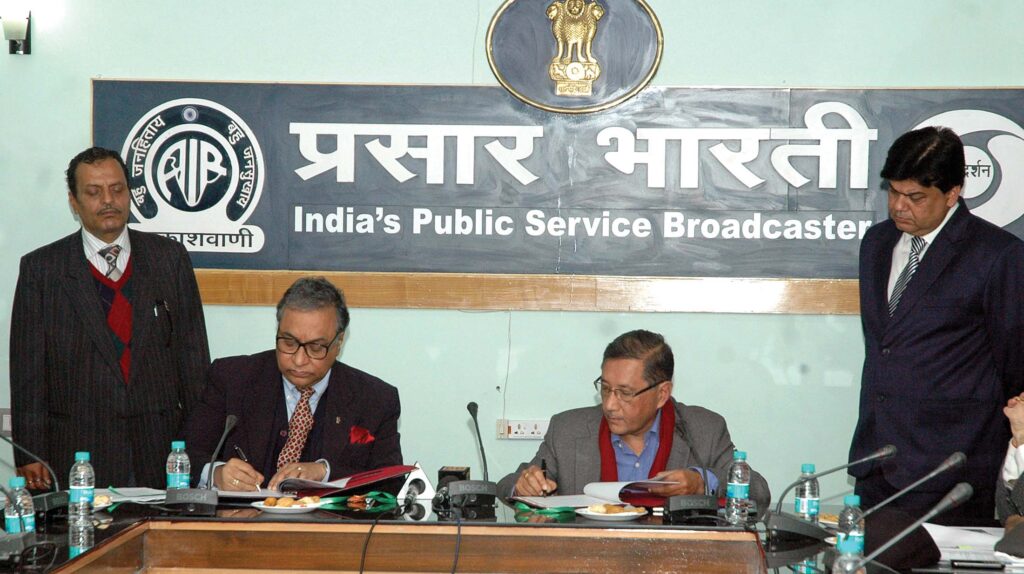IT was a momentous occasion when P Upendra, the then Minister for Information & Broadcasting in the National Front government, reeled out assurances to Parliament on formation of a Corporation that would usher the promised autonomy in Doordarshan (DD) and All India Radio (AIR). Over 3,000 staffers collected from all over the country walked to the Prime Minister’s residence. That forced the government to manumit the Public Service Broadcast, which was an event of the time. The professionals, along with many sympathisers, rejoiced over the perceived functional freedom, with a strong section of the bureaucracy gaping with disbelief and sneer at an exciting piece of cake snatched from right under their nose.
Some even compared Upendra’s words assuring a concerned Parliament with the epochal ‘tryst with destiny’ speech: “Sir, Prasar Bharati is a gift to the nation given by this government (National Front). It is a sort of freedom. We believe in unfettered media because that would add strength to our democratic fabric.” He further stressed, “We have very competent people to handle this media. We have qualified people and given the opportunity, they can do a good job. We are recognising their service and are creating a new cadre of IBPS.” He concluded the debate with the passage of the Prasar Bharati Act on August 29-30, 1990.
The dream sown by the National Front government soon went sour with instances of ineptitude that did not help the organisation achieve its mandate. The vision of a free or autonomous media soon got sullied by an impervious bureaucracy that was determined to hijack the new-found freedom.
FOR long, media thinkers have been talking of bringing in changes in the Act which was drafted in a hurry and without giving enough thought to the needs of a Public Service Broadcast (PSB) organisation. The Act, while talking of formation of the Board, surprisingly does not speak of functional autonomy, or define the role of a professional for whom the autonomy was conceived! The creation of a Board overseeing activities has turned a stumbling block for the professional at least. Even its own relevance over the period has become questionable with a series of wrongdoings highlighted in excoriating references. This was caught on to by the eagle-eyed bureaucracy. Soon, one found them lollygagging in the cadre that was specifically not meant for them and SS Gill became the first CEO.
But this maiden outing of the bureaucracy with the media resulted in an unsavoury casualty for them. Gill was ousted within no time and the reason cited was the usual tunnel vision and highfaluting approach of the bureaucracy. Not used to bestowing smiles without reason, Gill was not attuned to responses that the media demanded. A job that entailed interacting with the high and low, giving equal space even to a small dholak player, was something a bureaucrat was not used to. Jeetendra, the popular cine star, and his daughter, Ekta Kapoor, requested a brief introductory meeting with the new CEO. The cine star, in the customary style, asked to see him for two minutes, an euphemism used to stress urgency. Gill “granted an audience”.
The actor flew down from Mumbai. He was ushered into the CEO’s room. Soon the fuming actor stomped out spewing invectives. “He saw me, heard me say pleasantries, looked at his watch exactly after two minutes and asked me to leave, saying, “Your ‘two minutes over’ … What a bloody insult…!” It is another matter that Gill was sacked by the then government for his lack of knowledge and boorish demeanour. This was the beginning of Prasar Bharati.
The imperative need to understand the basics of autonomy in a Public Service Broadcast organisation necessitates a debate on why there should be one. While addressing the larger issue, the government oscillates between acting as a social broadcaster and turning into a commercial service whenever it gets an opportunity. This duality has left Prasar Bharati fumbling for an identity. While on the one hand it speaks of finances to be arranged by internal sources or annual outlays, a debilitated political leadership never attempted to give it confidence and direction. It was a ploy of the bureaucracy to keep professionals away and create a role for itself. Resultantly, both Doordarshan and AIR failed to create benchmarks as content provider and a voice that could impress a nation. Sadly, this has never been debated in either the ministry or in Parliament.
The Information Service cadre which for long has staked claim to lording it over DD News has failed on every count. Right from the day it took over, the objective and glamour has all vanished with tired faces and poorly drafted scripts. The IIS babus have no understanding of hard media except handing out press notes or handbills. They are constantly engaging so-called experts and advisers without tangible impact.
The political masters have no understanding of media intricacies and the controlling bureaucrat too is a fiddling jack while the real master, the professional, hides behind all the mismanagement, ruing his luck and cursing the system. Undeniably, an incompetent Board with other members equally unaware of the requirements has brought the behemoth to its lowest ebb. With members falling for petty gains and comforts, they kept supporting CEOs in corrupt and unprofessional activities. So much so, the previous part-time Chairperson even got her driver paid by Prasar Bharati against the set norms. The CWG scam was one such area that had tacit approval of the Board along with other huge financial irregularities that went on in confidence. Perhaps it would be of great academic interest if Prasar Bharati presents a White Paper on its performance since inception. All CEOs would be exposed for their utter lack of job knowledge and serious inadequacies.
THE periodic assessments made by Standing Committees of Parliament on IT especially in its 47th and 60th Reports, kept revving up the issue of “functional autonomy”, programming and even development of human resources, all of which were grossly ignored, leading to decimation of purpose. Imagine a Board or its CEOs which till date “slow paced all recruitment policies” despite contempt notices from the apex court, while tinkering with areas meant only for professionals. A CEO or a DG on deputation would be more inclined to approve ‘commercial feature films’ than addressing the administrative needs of the organisation. He likes to live his role by giving heavy-worded lectures on the future of media, totally forgetting his role of creating an administrative bridge between the organisation and Ministry. The just retired DG was one such example. But who will ‘judge’ the administrator?
The Supreme Court on March 29, 2005 directed that the uncertainty about the service conditions of employees be resolved expeditiously. Despite legal contempt and another deadline of August 2, 2007, nothing concrete happened. This resulted in discontentment and indiscipline. So much so, the basic functioning of a programmer for conducting auditions, selecting presenters and comperes, enchanted one CEO to the extent that he ensured he would meet and approve every budding female anchor for a sports programme, before she went on air, taking it as his responsibility!

Doordarshan especially has turned into a hunting ground for those longing for an exciting place without accountability. There are people who, without modicum of any media expertise, are made channel heads. Even those trained for Excise, Railways, Income Tax and GAD are squatting as media experts now. Strangely, no one measures their knowledge and contributions for the sea of babus is shielding each other! In another such instance, a police officer inducted in Vigilance earlier proposed to have a one-room cell for “interrogation” in the Prasar Bharati block. The idea of creating another thana was immediately doused but it spoke of the mindsets that were working actively.

The induction of short-term contractual experts further indicates lack of vision and interest. There are many so-called advisers who, rather than their competencies, boast of their fathers’ and family links for such engagements. It’s ironical that senior officers from the organisation and those retired with unmatched expertise in content and management are eased out to rehabilitate such incompetents. This is part of a design to minimise any professional thinking and approach. It is ironical that many Doordarshan and AIR professionals are contributing immensely to private channels while the bunch of advisers inducted into Doordarshan is leading it further into the abyss. Will anyone own up the mess?
Within the setup, there is another lot of professionals, albeit junior, but better trained and engaged, with experience varying from five years to almost a decade. These are, in fact, the backbone of transmission and programme production. This junior lot has helped keep the TV screens alive till now but a directionless organisation is bent upon decimating its own interests. Those deserving to be absorbed are languishing with a pittance as compared to the non-performing advisers. Despite the best of media degrees, they are forced to take exams for further extensions and progress at the mercy of the non- professional. Imagine a broadcast executive or content generator paid on a par with a truck driver without provisions for his/her future. What could be a bigger slur on professional competence?
Why could a CEO or DG not see through this bizarre happening of administrative babus transgressing professional recruitments? There was an equal interest in engagement of casual production hands instead of bringing about reforms facilitating easy inflow of content. Recently, in one selection committee, four members were from administration while one was an engineer. No wonder, there are allegations of inductions of no merit. That is the curse of autonomy!
One cannot forget the inputs of programme cadres that created unforgettable voices and faces that till today overshadow the best of names around. Could one ignore Niti Ravindran, Geetanjali Aiyer, Tejeshwar Singh, Salma, Shammi Narang, Rini, Meenu and so many of them. There were announcers too that were eagerly awaited and Mukta Srivastava, Sadhna, Anjali Rai, Jasleen, Jaishree and so many doe-eyed ladies bestowing their charms onscreen.
If, on the one hand, there is the most harried lot of staffers, on the other is the equally sad plight of the ‘outside producers’. These selected producers are commissioned to make software for a starved organisation after due process. Once given an assignment, their harassment begins. There are usual instances of intentional delays in programme evaluation, preview, motivated reports, and delays in release of bank guarantees that is a highly faulty and objectionable stipulation, each person expecting a benefit or two. Even those releasing cheques allegedly demand ‘something’ or some say that letters are sent to incorrect addresses! No CEO or Finance Head has ever looked into these allegations and improved the system.
HOW could it ever improve? If those trained in Finance, Accounts and Income Tax are made channel heads even for language-oriented Urdu, Kashir or International Affairs, there has to be confusion. Why would anyone engage Namita Gokhale or Kanungo, daughter of the former Secretary, Civil Aviation, and pay over lakh and a half for merely advising a programme to be produced? Till date no one knows their expertise in TV production except that they are close to the CEO and offsprings of bureaucrats. The autonomy for them is ungainful participation facilitated by the CEO.
It is startling that after a Parliament question on engagement of inexperienced advisers, the CEO masterminded a reduction in experienced officers engaged as consultants to satisfy an ignorant ministry. He compromised talented professionals to safeguard his incompetent advisers.
Further, no one, it seems, took measures to ensure that payments are made by cheque and not cash, thereby eliminating scope for underpayment, commissions and corruption, keeping the mandatory provisions of PF and medical facilities in view. This exploitation of casual workers has never been addressed by any CEO or DG. Similarly, those entrusted with transfers and postings are blank about expertise or need for a particular person in an area. As a result, there are many square pegs in round holes. There is a serious flaw in personnel management being entrusted to those having no idea of media, human relations and market realities.
How could the same personnel department justify dissipation of public funds for people who, with no idea of television production, management, marketing and brand enhancement, are causing holes in the system? For instance, a former Secretary has been baptised as Principal Adviser for Archives. How can a person with no idea of content availability, video libraries and system of preservation be paid for no contribution for almost two years? He was paid Rs. 75,000 a month with another Rs. 5,000 for attending office each day with airfares from his hometown, Pune. Naturally, there will be concerns about this utter wasteful expenditure. On the contrary, a TV producer was paid a pittance of Rs. 2.5 lakh to Rs. 3 lakh an episode for making “high quality” content with 30 per cent going on sundry expenses. Who stands accountable for this public squandering?
For years, Doordarshan did not use its studio at Vigyan Bhawan which was eventually taken back by the concerned department. Its studio utilisation is so low that one wonders whether it produces anything! Stringers are engaged, in Delhi, where there is huge presence of network and staff. There is no combined coordination of coverage and there have been instances where a team each from News and Programme go to cover the same function!
Perhaps nowhere are toilets used for storing expensive engineering equipment. Needless to say, Doordarshan has the most expensive and latest set of equipment. Toilets in CPC for long were used as storerooms.
Despite the advent of new technologies and updated content formats, there was no serious attempt to put the staff on a par with others in electronic media. The international exchange programmes where staff would earlier be sent for better training are constantly misused by some of the CEOs or their cronies lusting for foreign trips. In one such instance, BS Lalli, former CEO, went to the US where junior producers from other TV channels were shocked to have him amidst them. Embarrassed, the CEO went sightseeing courtesy of a hardware supplier, never to return. Such opportunities aplenty were wasted by the administrative wing. In a recent instance, retired persons were sent to Egypt whereas young professionals could have been given the opportunity for exposure. The role of the ministry and the Prasar Bharati Secretariat in sanctioning such trips cannot be ignored.
Perhaps it’s a classic case of media management where you find more people carrying files and notesheets instead of tapes and cameras. It’s a sad commentary that Prasar Bharati boasts of more clerks and babus than actual media-makers. A visit to Mandi House makes you feel as if you are getting into a Labour Commissioner’s office rather than that of a media conglomerate!
Even banks peruse the competence of fund seekers before disbursing funds. Prasar Bharati is a classic example where funds have been drained down the years. Despite the nosedive, the ministry till date has not got an internal audit done or fixed accountability for the dismal record of Prasar Bharati. There is serious complicity of interests between the ministry and mandarins in Prasar Bharati.
THE near absence of experienced TV film producers offering content is because of convoluted financial guidelines and this itself should have sparked alarm bells. New policies should have been drafted inviting talented people. The conspicuous downslide and the manner in which Prasar Bharati has lost its moorings and relevance through wrong selection of CEOs and other deputationists, however, is cause for concern. How long will Prasar Bharati be allowed to guzzle public funds without accountability?
It was ‘functional freedom’ that was designed for Prasar Bharati to be managed, Parliament was assured, by professionals only. How could these bureaucrats intrude into an organisation where they are not only misfits but unwanted for their incompetence and absence of media sense?
The new political dispensation has to go into the gamut of public service broadcasting with a fresh perspective. If they too are relying on the non-performing tools of the previous set-up, then it is high time the farce of autonomy be dispensed with.
The writer was earlier with Doordarshan and AIR (He can be reached at vinodkapoor555@gmail.com)





























































